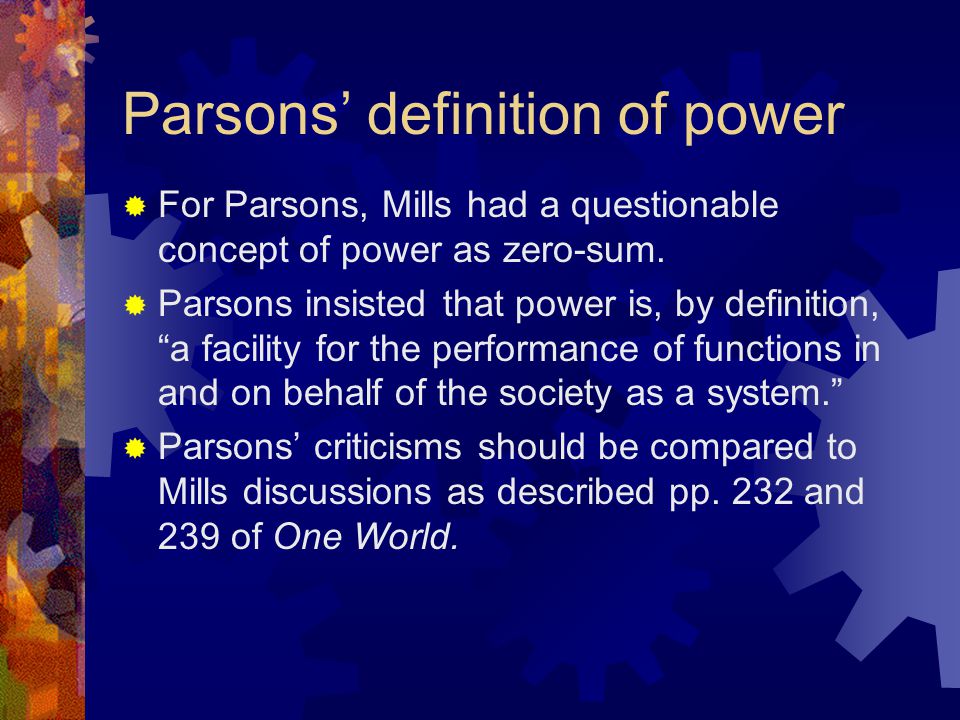Relevance: Sociology: paper I: Thinkers
- Parsons regards power as something possessed by society as a whole. As such power is a generalized facility of resources in the society. It is the capacity to mobilize the resources of the society for the attainment of goals for which a general public commitment has been made.
- In this sense the amount of power in society is measured by the degree to which collective goals are realized. Thus the greater efficiency of a social system for achieving the goals defined by its members, the more power exists in society. This view is known as variable sum concept of power (different from Weberian and Marxian constant sum concept of power), since power in society is not seen as fixed as contrast. Instead it is variable in the sense it can increase or decrease.
- Parsons view of power is developed from his general theory of the nature of society. He believes that order, stability and cooperation in society are based on value consensus, that is a general agreement by members of society concerning what is good and worthwhile. He assumes that this value consensus is essential for the survival of social system. From shared values desire the collective goals, that is goals shared by members of society.
- For example if materialism is a major value of the Western Industrial society, collective goals such as economic expansion and higher living standards can be seem to these goals, the greater the power that resides in the social system. Steadily rising living standards and economic growth are therefore the indications of an increase of power for the society as a whole.
- Parson view of power differential within society also derives from his general theory of social system. He argues since goals are shared by all members of society, power will generally be used in the furtherance of collective goals. Thus, for Parsons, power is an integrative face in social system just as social stratification.
- Parsons argues that as value consensus is an essential component of all societies, if follows that some form of stratification results from the ranking of individuals in terms of society, values will be ranked highly and accorded high prestige and power sicken they exemplify and personify common values. And Parsons, a functionalist, believes that this differential distribution of power and prestige among the different strata of society is just, right and proper since they are basically an expression of shared values.
- Parsons views relationship between the social groups in a society as one of cooperation and interdependence rather than conflict and confrontation. Particularly in complex industrial societies different groups specialize in particular activities.
- As no one group is self sufficient it cannot meet the needs of its members and hence each group enter interaction with other groups for exchange of goods and services which makes the relationship between different social groups one of reciprocity. This relationship extends top the strata in a stratification system.
- In individual societies, which exhibit highly specialized division of labour some members, will specialize in organization and planning (those who govern), others will follow their directions (those who governed). Parsons argues that this inevitably lead to inequality in terms of power and prestige.
- Parsons’ later work on power involved a conscious modification of his previous views (Giddens 1995). In his later works criticizing C.W. Mills’ power theory Parson viewed power as generated by social system in much the same as wealth was generated in this productive organization economy. The parallels, which Parsons developed between power and money, were based upon the supposition that each had similar role in the two of the four functional subsystems of the socials systems evolved by Parsons.
- Power for Parsons is a direct derivative of authority. Authority for him is institutionalized legitimation which underlay power and was defined as the institutionalization of the rights of leaders to expect support from the members of the collectivity (Parsons 1960). By speaking of binding obligation, Parsons deliberately brought legitimation into the very definition of power, so that for him there was no such thing as illegitimate power (Giddens 1995).
- Parsons argues that inequalities of power are based on shared values. Power is legitimate authority in that members of society as a whole generally accept it as just and proper. Parsons views power and prestige differentials associated with social stratification is both inevitable and functional for the society. It is inevitable because it derives from shared values, which are necessary part of all social system. It is functional because it serves to integrate various social groups.
Relevance of these Theories:
- Marx and Parsons both have tried to interpret power in specific situations and so tended to be more extreme in their course. Generally people do neither use the power only in self interest to create conflict or for only welfare of the mass. However, the power is used for both the things together. Therefore, both Marx and Parsons are not completely universally relevant in this aspect.
In the context of constant and variable sum of power
- These two seemingly opposite concepts are given by Karl Marx and T. Parsons respectively. Both of them have their own view points, therefore, none of them could be said to be irrelevant. Parsons views it in the context of power-holder only and so its growth proves the concept of ‘variable sum of power’ whereas Marx sees it as a relation between haves and have-nots and finds it to be constant forever.


